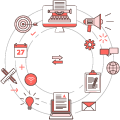Artificial intelligence is becoming a crucial rite of passage into the twenty-first century for company operations and practices. A clear AI strategy is currently in place in 47 percent of digitally mature organizations (those with innovative online techniques), and 84 percent of business leaders feel that AI helps their company achieve a competitive edge.
The broad adoption of artificial intelligence in digital marketing demonstrates the technology's importance in today's digital ecosystem. We'll go through the impact of digital technologies on digital marketing and how you can use AI to improve your marketing approach.
The Relationship between AI and Digital Marketing
In recent years, marketers have been wary of incorporating artificial intelligence into their marketing tactics. However, many prominent firms have adopted it and used it in their marketing strategies, with giants such as Amazon and Spotify successfully employing Artificial intelligence systems.
Amazon, for instance, employs artificial intelligence to show customers only relevant products based on their previous searches, transactions, and views. You can boost the chances of a customer making their first purchase or becoming a return customer through their personalized experience.
Artificial intelligence (AI) in digital marketing has become a reality with many advantages and possibilities.
Let's look at how artificial intelligence can help us with our digital marketing strategy.
Targeting for a More Specific Audience
AI enables you to analyze data better, predicting your ideal consumers' purchasing habits. If you want to improve the message in your marketing assets, utilizing data from various sources like internet cookies and transactions is a bright place to start.
Investment in data-driven analytics also aids in the understanding of the most important question of all: why do consumers buy from you? AI allows you to target your ideal customer precisely, highlighting unique selling points that might help your company stand out.
Unique Online Experiences
Just like in the real world, individualized information and experiences online might mean the difference between winning mental space with your intended audience and being lost in the shuffle. By tailoring content and delivery depending on geography, likes, dislikes, online activity, devices, and more, AI enables companies to create unique, personalized consumer journeys online. To utilize information through email marketing, landing pages, and even real-time adverts, resulting in a different experience and relevancy, raising conversion rates.
Obtaining Purchaser Support
Marketing departments may need help convincing business stakeholders of the value of AI investments. While ROI and efficiency are easy to measure, demonstrating how AI has enhanced user experience or brand image is more complicated. With all that in mind, digital marketing agencies must ensure they have the tools to link these qualitative advantages to AI investments.
Developing Unique Content
You could also use AI algorithms to create unique content on websites, blogs, goods, and more, as unbelievable as it may seem. AI can develop effective and meaningful content by evaluating massive amounts of existing web data around a particular topic or theme. It might benefit enterprises that demand quick turnaround times on original programmings, such as news publishers. Yes, it has its limits, such as the inability to articulate an opinion article, but based on its current capabilities, this is a promising tool.
Advertising on the Internet using Artificial Intelligence
Digital advertising is, without a doubt, among the most effective applications. AI is used to give you possible experience on platforms such as Facebook, Google, and Instagram. Users' data, such as gender, age, hobbies, demographics, and other factors, are analyzed by these platforms to offer them much more relevant adverts, boosting the effectiveness of digital ads.
According to eMarketer, global digital ad spending reached $273.29 billion and has been increasing rapidly. Marketers may detect microtrends and even forecast trends using AI technologies. They could then make sensible judgments about how to spend their money and who they want to target. As a result, marketers can cut down on wasted digital ad expenditure and guarantee no money loss.
Take Quicker Decisions
AI can analyze tactical data faster than humans and utilize machine learning to make quick decisions based on marketing and customer context. AI frees up your time for team members to concentrate on strategic projects so you can be subsequently used to inform AI-powered marketing. Advertisers can also use real-time analytics to determine more innovative media selections, rather than waiting until the conclusion of a campaign to make judgments, thanks to AI.
Inputs into Strategy
Without question, AI is far superior at turning large amounts of marketing data into useful information. AI can assist us in examining what has worked and what hasn't and forecast future client behavior using sophisticated predictive methods & software. Through this, marketers point critical data to optimize their marketing presence and good campaign management.
Predictive Marketing Analytics
With that much data flowing in, marketing departments struggle to make sense of it. Predictive modeling, which uses a combination of machine learning, techniques, algorithms, and databases to forecast future behavior, promotes a sense teams make the most out of this data with AI. You can assist marketing teams in determining what types of things consumers want and when they will seek them, allowing them to position ads better.
For companies that want to stay competitive, there are other options besides keeping up with the latest marketing trends. Consumer expectations rise in tandem with technological advancements, and a wise business owner must strive to satisfy them.
The remarkable thing is that several low-cost options don't require technical expertise. These tools can assist you in staying current in the ever-changing digital marketing industry.



















 Digital Marketing Company In Delhi
Digital Marketing Company In Delhi  Seo Company In Delhi
Seo Company In Delhi  Influencer Marketing
Influencer Marketing  Quora Marketing
Quora Marketing  Digital Marketing In Chennai
Digital Marketing In Chennai  Seo Company In Kolkata
Seo Company In Kolkata  Digital Marketing In Kolkata
Digital Marketing In Kolkata  Digital Marketing In Ahmedabad
Digital Marketing In Ahmedabad  Digital Marketing In Pune
Digital Marketing In Pune  Free Website Analysis
Free Website Analysis 




